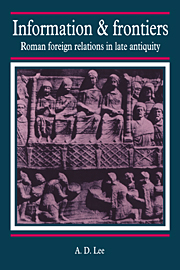Book contents
- Frontmatter
- Contents
- Preface
- Chronological list of selected Roman emperors (early third to early seventh century)
- Chronological list of Sasanian kings (220s–628)
- Map 1 The Middle East in late antiquity
- Map 2 Northern Mesopotamia and adjacent regions
- Map 3 The middle and lower Danube and adjacent regions
- Map 4 The Rhine and upper Danube and adjacent regions
- List of abbreviations
- Introduction
- PART I CONTEXTS
- PART II INFORMATION AND UNCERTAINTY
- PART III SOURCES OF INFORMATION
- Select bibliography
- Index of sources
- General index
- Frontmatter
- Contents
- Preface
- Chronological list of selected Roman emperors (early third to early seventh century)
- Chronological list of Sasanian kings (220s–628)
- Map 1 The Middle East in late antiquity
- Map 2 Northern Mesopotamia and adjacent regions
- Map 3 The middle and lower Danube and adjacent regions
- Map 4 The Rhine and upper Danube and adjacent regions
- List of abbreviations
- Introduction
- PART I CONTEXTS
- PART II INFORMATION AND UNCERTAINTY
- PART III SOURCES OF INFORMATION
- Select bibliography
- Index of sources
- General index
Summary
the preface is traditionally the place where one offers a justification for the writing of a book. In this case, however, the question was not whether the subject was one worth writing about, but rather whether it was feasible, given the limitations of the available sources. The role of information in Roman foreign relations during late antiquity is a field of enquiry whose importance should be self-evident, yet, perhaps because of the apparent dearth of relevant material, it has not previously been investigated in a systematic manner. I hope to have shown that greater progress can be made than might otherwise have been thought possible, even if many pertinent questions have had to be left without satisfactory answers.
It will be readily apparent from the footnotes how much this book owes to the labours of numerous late Roman and early Byzantine scholars, especially in recent decades and in the elucidation of the literary sources. I have endeavoured to acquaint myself with as much of the relevant modern literature as possible, but in so vast a field I am bound to have overlooked items; some publications have appeared too late for me to use, notably the volume on Byzantine Diplomacy edited by Simon Franklin and Jonathon Shepard which includes a number of papers dealing with late antiquity.
- Type
- Chapter
- Information
- Information and FrontiersRoman Foreign Relations in Late Antiquity, pp. xi - xiiPublisher: Cambridge University PressPrint publication year: 1993

